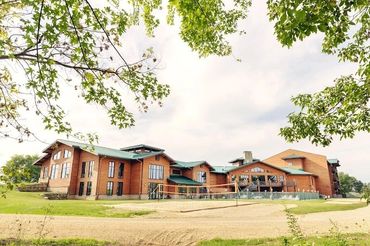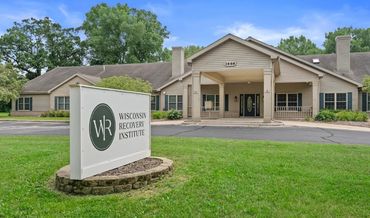
Cognitive Behavioral Therapy (CBT) for Addiction in Wisconsin
Find Cognitive Behavioral Therapy (CBT) treatment for addiction in Wisconsin. CBT helps treat addiction by identifying triggers, changing harmful thought patterns, building coping skills, and preventing relapse through improved self-awareness and decision-making. Find CBT treatment centers in Wisconsin today!
Treatment Centers in Wisconsin
Open to Travel? Check out Top-Rated Options
All Treatment Centers in Wisconsin
Are You Covered For Treatment?
- Milwaukee Rehabs
- Madison Rehabs
- Green Bay Rehabs
- Waukesha Rehabs
- Kenosha Rehabs
- Appleton Rehabs
- Eau Claire Rehabs
- La Crosse Rehabs
- Oconomowoc Rehabs
- Sheboygan Rehabs
Rehab Insurance Coverage in Wisconsin
Rehab Centers in Wisconsin
Information About Rehab in Wisconsin
Latest Reviews
Latest Reviews of Rehabs in Wisconsin
Waukesha Comprehensive Treatment Center
Good people, this clinic saved my life. I did go through 2 counselors before I was connected with the counselor that made me work hard. Once that happened I started seeing light at the end of the tunnel. 2 years later I took my last dose of methadone and never looked back. It does take time. There is no magic bullet treatment. You have to want to get clean to get clean but the right counselor made that difference for me. If anyone struggling reads this just know that it is possible to get your life back. I’m living proof of that! Godspeed…..
Casa Clare, a division of Apricity
House managers are in recovery is a strength of the facility. There is favorability over clients
Meta House
You can bring your children to live with you in residential treatment and transitional living follow thru is not good. Best program in Milwaukee, WI.
About Wisconsin
Wisconsin is located in the Midwest region of the United States. As of 2021, the population of Wisconsin is approximately 5.8 million people,1 with its largest city being Milwaukee. Wisconsin is known for its beautiful natural scenery, with rolling hills, forests, and freshwater lakes and rivers. The state is also home to several noteworthy cultural and historical landmarks, including the Harley-Davidson Museum, the Wisconsin State Capitol, and the world-renowned House on the Rock.
The state is famous for its dairy industry, producing a large variety of cheeses, as well as its beer production, with Milwaukee being known as the “Beer Capital of the World.” Wisconsin’s culture is deeply rooted in its German and Scandinavian heritage, and the state is known for its love of sports, especially football and basketball. Overall, Wisconsin is a diverse state with a rich history and culture, and its natural beauty makes it a popular destination for tourists and residents alike.
Addiction in Wisconsin
Addiction is a serious problem in Wisconsin, as it is in many parts of the United States. Wisconsin has especially been affected by the country’s ongoing opioid epidemic. According to the Wisconsin Department of Health Services, the number of opioid-related deaths and emergency room hospitalizations between 2018 and 2020 increased by 46.7%.2
In addition, a recent report shows that Wisconsin had an average annual prevalence of 7.7% (equivalent to 376,000 individuals) with past-year substance use disorder between 2017 to 2019.3 By 2021, 1,175 drug overdose fatalities were reported within the state. 4
Addiction Treatment in Wisconsin
There are several levels of addiction treatment available in Wisconsin, each with their own unique benefits. They include:
- Detox: Detox programs are typically the first step in addiction treatment and involve medical supervision to help individuals safely and comfortably withdraw from drugs or alcohol.
- Inpatient Treatment: Inpatient treatment provides a higher level of care, with individuals residing in a treatment facility for a period of time and participating in a structured program that includes counseling, group therapy, and other specialized therapies.
- Outpatient Treatment: Outpatient treatment allows individuals to receive treatment while still living at home, with therapy sessions typically held several times per week.
In addition to these treatment levels, there are also specialized programs available for certain populations, such as adolescents, veterans, and LGBTQ+ individuals. Some treatment centers also offer alternative therapies like yoga and meditation, as well as holistic treatment options that address the whole person, including their physical, emotional, and spiritual well-being.
For those seeking luxury rehab options, there are high-end treatment centers in Wisconsin that offer amenities like private rooms, gourmet meals, and spa services. Private funded rehabs are another option for individuals who are able to pay for treatment out of pocket.
To find a rehab center in Wisconsin, you can use our online rehab locator tool to research and compare different treatment options near you and find the best fit for your unique needs and circumstances.
How Much Does Rehab Cost?
Insurance can often be used to pay for addiction treatment, with most plans offering coverage for substance abuse and mental health treatment. Depending on the plan, insurance may cover part or all of the cost of treatment, including detox, inpatient, and outpatient care. It’s essential to contact your insurance provider to understand what is covered and to determine any out-of-pocket costs.
If you are currently without insurance, there are state-funded treatment centers available in Wisconsin. These centers are typically supported by state or federal funding and offer treatment at no cost or on a sliding scale based on income. However, these centers may have limited availability and may have longer wait times for admission.
In-Network Insurance Options
Length of Stay in Rehab
When it comes to addiction treatment in Wisconsin, you have options regarding the length of stay. The most common durations for treatment are 30 days, 60 days, and 90 days. The length of stay typically depends on the severity of your addiction and your unique treatment needs.
If you require more extensive treatment, long-term rehab programs are available. These programs typically last between 6 months to 2 years, depending on your treatment needs and the specific facility or program you are enrolled in. Long-term rehab programs are designed to provide a more comprehensive approach to treatment, with a focus on addressing underlying issues and providing ongoing support and care.
Recovery Starts Today
Finding the right addiction treatment is crucial for achieving lifelong recovery. There are various levels of treatment available in Wisconsin, and you should carefully consider your options based on your unique needs and circumstances. Whether it’s detox, inpatient, outpatient, or long-term rehab, the right treatment program can make all the difference in achieving lasting recovery. It’s essential to take the time to research and compare different options to find the treatment program that is the best fit for you.
Sources:
- United States Census Bureau. QuickFacts-Wisconsin. July 1, 2022.
- Wisconsin Department of Health Services. Dose of Reality: Opioid Data Summary Dashboard. September 7, 2022.
- Substance Abuse and Mental Health Services Administration. Behavioral Health Barometer: Wisconsin, Volume 6.
- Centers for Disease Control and Prevention. Drug Overdose Mortality by State.





















